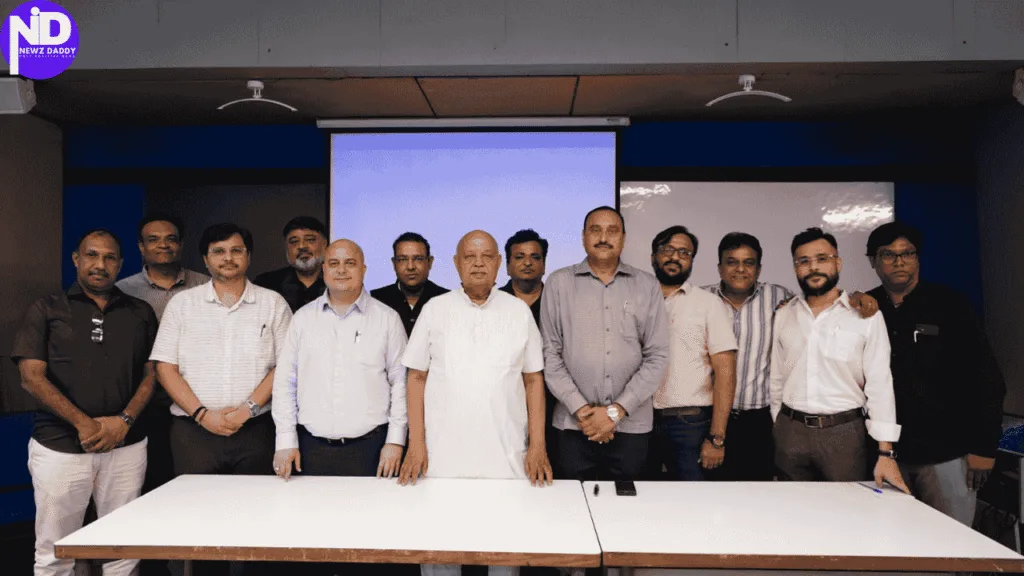Detergent Industry India urges GST cut to 5% to grow and help MSMEs
Newzdaddy Business Updates
The Gujarat Small Scale Detergent Manufacturers Association (GSSDMA), representing over 500 members, has urged the Central Government to extend policy support and GST rationalisation to boost the detergent and soap industry in line with the vision of “Make in India” and “Atmanirbhar Bharat.”
The GSSDMA is a trade body that helps small-scale soap and detergent makers in Gujarat. It gives them technical help, training, and a voice with government agencies. The association supports about 500 businesses that make household soaps, laundry detergents, dishwashing liquids, and raw materials like oils, fats, and surfactants.
According to Mr. Naresh Jain, Chairman of the Association, “The detergent industry in India is currently valued at around INR 40,000 crore and is growing steadily at a CAGR of 7%. With India being one of the largest consumer markets globally, this sector is strategically positioned to emerge as a global manufacturing hub under the Make in India and Atmanirbhar Bharat initiatives.”
Reports show that India’s detergent and soap market is indeed large and growing. A steady growth rate of 7% tells us the industry is healthy. Many experts agree that with good policy support, Indian-made detergent brands can reach even more homes and expand exports.
At present, the industry is facing several critical challenges. High GST rates and an inverted duty structure are creating severe working capital and competitiveness issues for MSME manufacturers. Products under HSN 3401 (soaps and organic surface-active products) and HSN 3402 (detergent powders, cakes, liquids, etc.) are currently taxed at 18%. Additionally, high import duties on key raw materials such as LAB, fatty alcohols, surfactants, and packaging materials have escalated production costs. Multiple overlapping compliance requirements further add to the burden on small and medium enterprises.
The GST for soaps and cleansing products is indeed set at 18%, which makes it expensive for small makers. Also, having to pay more tax on raw materials than on the final products makes their finances tight—a big challenge for MSMEs. Adding to that. Navigating several rules and documents makes their lives harder.
To address these concerns, the Association convened a meeting where Mr. Jain highlighted that reducing the GST rate from 18% to 5% could significantly expand the industry’s potential. Such a measure could help the market grow to over INR 1,00,000 crore, improve affordability, increase penetration of quality Indian-made detergents into rural markets, and enable MSME manufacturers to introduce more eco-friendly formulations. It would also create large-scale employment opportunities, especially in states like Gujarat, where over 500 MSMEs are already generating jobs for unskilled labour. Moreover, the industry’s CAGR growth could rise from the current 7% to over 10%.
Lowering GST to 5% can make Indian detergent products cheaper and more attractive, especially in rural areas. It would allow small factories to spend more on greener products, hire more people, and grow faster. The idea is that it could triple the market size and increase growth from 7% to more than 10%—a big boost for the economy.
The Association has put forward the following key demands: reduction of GST to 5% on HSN 3401 and 3402 products, special subsidies and working capital support for MSMEs, enhanced rebates under RoDTEP/SEZ schemes to boost exports, and the introduction of a single-window clearance system to ease compliance and eliminate red tape.
MSMEs often struggle to get loans or money to run their business. So, asking for working capital help and easier ways to get permissions through one window can really ease their struggles. Also, better export rebates would help them sell goods outside India. The RoDTEP (Remission of Duties and Taxes on Exported Products) and SEZ help can make exports cheaper and easier.
With the right policy support, the detergent and soap sector has the potential to cross Rs. 1,00,000 crore turnovers, generate large-scale employment, deliver affordable and eco-friendly hygiene products to every Indian household, and strengthen India’s position as a leading global exporter of essential hygiene products.
Good policy can help this sector grow big. That means more jobs, cleaner products, cheaper soaps in every home, and even more exports from India. The Association has earnestly appealed to the Government to extend the much-needed policy relaxations and incentives to this vital sector, thereby enabling it to realise its full potential in serving the nation’s economic and social development goals.
Must Read:
India’s plan for plastics exports sets AIPMA, MSMEs, and young talent in motion

